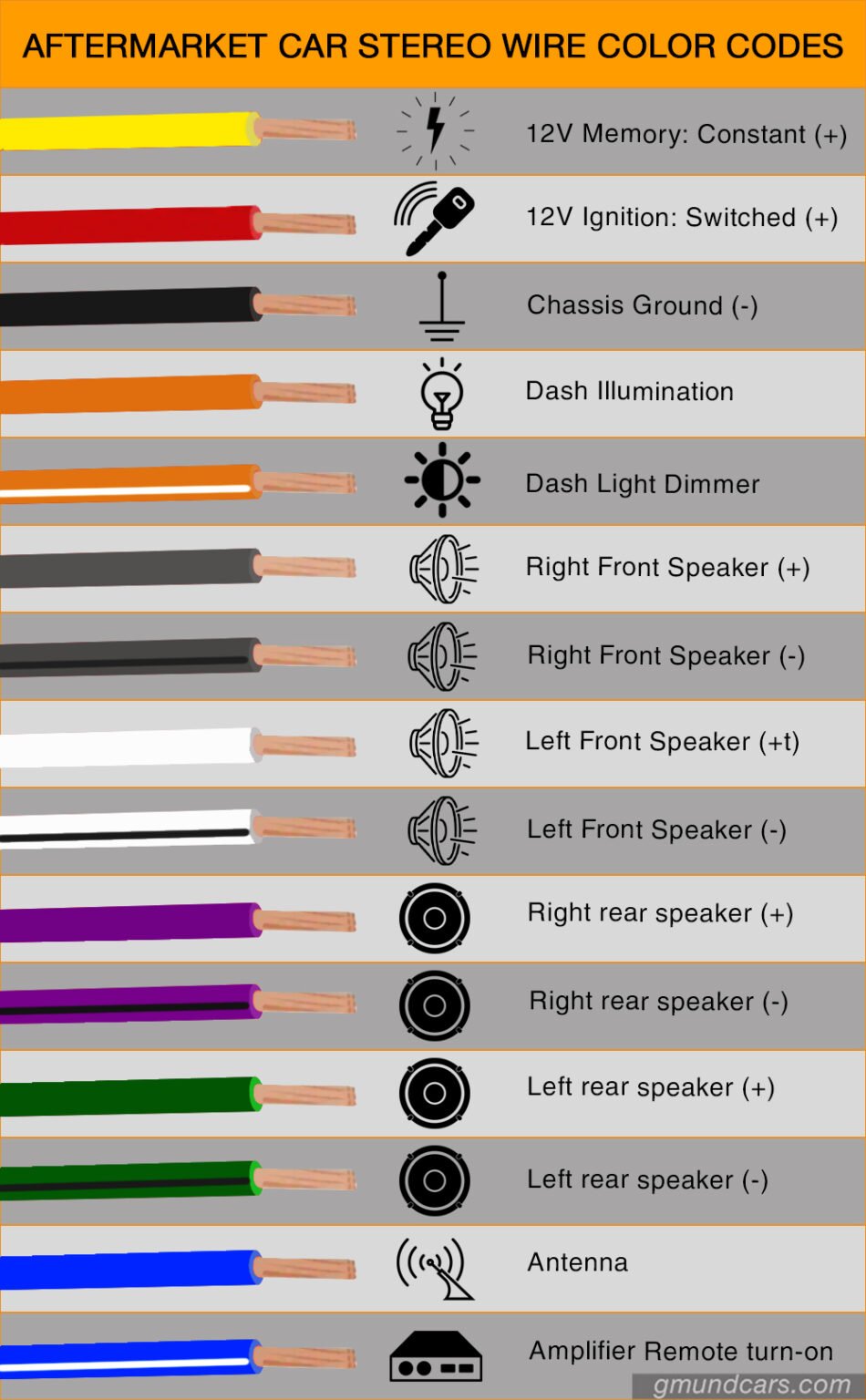Decoding the Rainbow: Your Guide to Automotive Wiring Color Codes
Ever peered under your car's dashboard and felt overwhelmed by a tangled mess of colorful wires? Don't worry, you're not alone. Understanding automotive wiring color codes is crucial for any DIY mechanic or car enthusiast. This vibrant spectrum of wires isn't random; each color carries a specific meaning, acting as a roadmap for your car's electrical system.
Imagine trying to navigate a city without street signs or traffic lights – chaos would ensue. Similarly, without standardized car wire color codes, working on your car's electrical system would be a nightmare. These codes provide a universal language for identifying the function of each wire, making diagnostics, repairs, and modifications significantly easier.
From the simple act of replacing a blown fuse to the more complex task of installing a new sound system, knowing the purpose of each wire is paramount. A misplaced connection can lead to anything from a minor inconvenience to a major malfunction, potentially damaging expensive components. This guide aims to demystify the world of automotive wiring color schemes, equipping you with the knowledge to confidently tackle electrical work.
The history of automotive wiring color codes traces back to the early days of automobiles, when electrical systems were much simpler. As vehicles became more sophisticated, the need for standardized wiring practices became apparent. Over time, conventions emerged, and while some variations exist between manufacturers and geographic regions, a core set of color codes has become widely adopted.
These color conventions aren't arbitrary; they're designed for safety and efficiency. For example, red often signifies power, while black is commonly ground. Understanding these fundamental color associations is essential for safe and effective electrical work. Mishandling a live wire can result in serious injury or damage to the vehicle's electrical system. Therefore, proper identification using color codes is critical.
The primary issue related to automotive wiring color codes is the potential for variation. While there are standardized colors for many circuits, manufacturers can sometimes deviate. This emphasizes the importance of consulting the vehicle's specific wiring diagram, which acts as the ultimate authority on its electrical system.
For instance, a red wire typically represents a power source, but it could have a different function in a particular make and model. Similarly, black often signifies ground, but it can sometimes be used for other purposes. Understanding these nuances can save you time and prevent costly mistakes.
One benefit of understanding these codes is efficient troubleshooting. If your headlights aren't working, knowing the color of the wire associated with the headlight circuit can quickly pinpoint the problem area. Another benefit is simplified modifications. Installing aftermarket accessories like a new stereo becomes much easier when you can readily identify the correct wires for power, ground, and speakers.
Furthermore, knowing color codes enables safer repairs. By correctly identifying power and ground wires, you can avoid accidental shorts and potential damage to sensitive electronic components. This is particularly important when working with higher voltage systems.
Advantages and Disadvantages of Standardized Automotive Wiring Color Codes
| Advantages | Disadvantages |
|---|---|
| Simplified Troubleshooting | Variations between Manufacturers |
| Easier Modifications and Installations | Potential for Misinterpretation without a Wiring Diagram |
| Enhanced Safety during Repairs |
Best Practices: Always disconnect the battery before working on any electrical system. Use a multimeter to verify the function of a wire before making any connections. Refer to the vehicle's specific wiring diagram. Use the correct gauge wire for any replacements or additions. Securely insulate all connections.
FAQ:
Q: Where can I find my car's wiring diagram? A: Owner's manual, online resources, repair manuals.
Q: What does a green wire usually represent? A: Often associated with ground circuits.
Q: What should I do if I encounter a non-standard wire color? A: Consult the vehicle's wiring diagram.
Q: Are automotive wiring color codes universal? A: While there are common standards, variations exist.
Q: What tools do I need to work with car wiring? A: Wire strippers, crimpers, multimeter, electrical tape.
Q: Is it safe to work on car wiring myself? A: Yes, with proper precautions and knowledge.
Q: What is the significance of wire gauge? A: Determines the wire's current carrying capacity.
Q: How can I learn more about car electrical systems? A: Online resources, automotive courses, repair manuals.
Conclusion: Mastering the language of automotive wiring color codes empowers you to take control of your vehicle's electrical system. From simple diagnostics to complex modifications, understanding these codes is essential for any car enthusiast or DIY mechanic. By following best practices and utilizing resources like wiring diagrams, you can confidently tackle electrical projects, saving time, money, and potentially preventing costly mistakes. While variations exist, the core principles remain consistent. Embrace the rainbow of wires under your dash, and embark on a journey of electrical enlightenment. This knowledge not only enhances your understanding of your vehicle, but it also allows you to maintain and repair it effectively, adding another layer of control and satisfaction to your automotive experience. So grab your multimeter, consult your wiring diagram, and start decoding the vibrant world of automotive wiring!
Time travel through music revisiting jethro tulls a new day yesterday
The brooding allure decoding emo dark backgrounds with the aesthetic boy
Selangors hottest new semi d properties your dream home awaits














